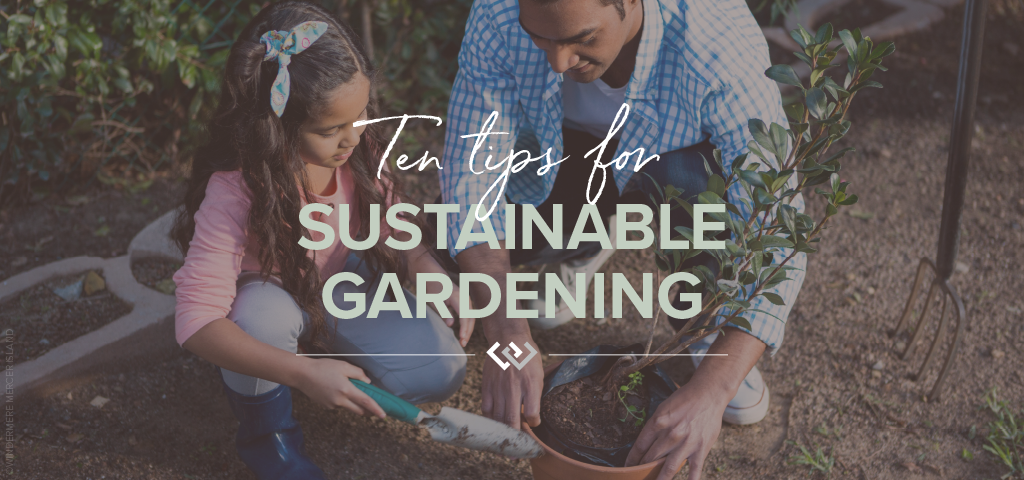Sunny days are finally here, the flowers are in bloom, and the timing is perfect to give your garden some love. Having a healthy garden is one of the best ways to create a sustainable home and reduce your household’s carbon footprint. Below are some eco-friendly tips that will help to make your garden even more sustainable…
1. Compost Your Waste
Composting, which puts your natural waste to good use, is the cornerstone of any sustainable garden. All grass clippings, dead leaves, plants, flowers, and the like are rich in nutrients. By composting, you provide your garden with a natural fertilizer, free of contaminants. Not only will this provide nourishment, but it will also help to produce healthier and tastier food. Here’s how to do it.
2. Try Mulching
If having a sustainable garden is your goal, it’s important to treat your soil with care. Laying down a couple of inches of mulch in mid- to late spring (think: grass clippings, wood chips or chopped leaves) enriches the soil and ensures it’s as healthy as can be. Mulch also conserves soil moisture, reduces weed growth and naturally moderates the temperature of the soil. You can cover either bare dirt or freshly planted food and flowers. Find more tips here.
3. Optimize Your Garden Design
It’s natural to want to accentuate the beauty of your garden when designing it, but the sustainable gardener will prioritize giving plants what they need. Take into consideration which plants need direct access to sunlight, which need the most space in the garden, and any special requirements a plant may need to inhabit optimal growing conditions.
Companion planting (choosing plants that benefit each other) will attract pollinators and deter pests. For example, peas & beans feed the soil with nitrogen, and nasturtiums can lure aphids away from other plants. Plant basil and tomatoes together, too–basil boosts the flavor of the tomatoes while scaring away pests.
4. Use Natural Weed Killers
One of the pillars of organic gardening is to reduce the use of chemicals whenever and wherever possible. Preventing weeds naturally by using landscape cloth, mulch or corn gluten meal is a great way to start. You can also make your own DIY weed killer from household items like vinegar or even boiling water as an effective substitute for harmful, chemical-based weed killers. Whichever method you choose, it’s important to weed by hand often.
5. Water Wisely
Substantial watering is critical to keeping your garden healthy, but overwatering is a common practice and leads to an unsustainable garden. Research the amount of water your plants and flowers need to make sure you aren’t overwatering. In our rainy climate, rain barrels are a useful tool as their function is to catch and conserve the water from your downspouts. Here’s a charming Canadian video on how to make and install a rain barrel.
6. Repurpose Poop
It’s time to get down and dirty. For a more sustainable garden and even healthier soil, consider adding animal manure. Chicken, sheep, and cow manure are all popular choices. Rich in nutrients, it can be used both as a fertilizer and as a soil conditioner. Make sure the manure you purchase is free of pathogens and ask about the recommended window of time from application to harvest before you begin using it.
7. Go Local
Planting natively is a fast ticket to sustainable gardening. Native plants are innately acclimated to local climate conditions, making them easier to grow and maintain. Native plants often require less water to grow due to their familiarity with the soil and rainfall in your region, which cuts down on your garden’s total water intake.
8. Collect Dried Seeds
YES, you can save your seeds and sow them next year. Wait until the seed is fully ripe before you collect it. It’s important to gather seeds when the weather is dry and to store them in a dry place. To produce healthy plants in the future, the seed must be completely dry. Here are some great tips on collecting & storing seeds.
9. Stop Garden Slugs
Slugs love wreaking havoc on gardens, eating through leaves and fruit, leaving a trail of destruction. Fortunately, there are also many things they hate…coffee grounds, for example. Chickens. Rosemary. Fennel. Drowning in beer traps. Check out these awesome tricks for making eco-friendly slug repellant…you can use these to replace traditional slug baits, which contain chemicals that are highly toxic to other animals.
10. Replace Your Gas Mower
How else can you reduce your garden’s carbon footprint? Replace your gas mower with a more sustainable alternative. Electric mowers and push mowers are functional and more eco-friendly replacements. They’re also quieter and you never have to mess with those stinky gas cans again. For added sustainability, consider replacing your other gas-powered equipment, such as trimmers and leaf blowers.
Pssst…Need a bigger yard for the garden of your dreams? I can help with that.

We earn the trust and loyalty of our brokers and clients by doing real estate exceptionally well. The leader in our market, we deliver client-focused service in an authentic, collaborative, and transparent manner and with the unmatched knowledge and expertise that comes from decades of experience.
2737 77th Ave SE, Mercer Island, WA 98040 | (206) 232-0446
mercerisland@windermere.com
© Copyright 2022, Windermere Real Estate/Mercer Island.
Adapted from an article that originally appeared on the Windermere blog April 14th, 2021. Written by: Sandy Dodge.

 Facebook
Facebook
 X
X
 Pinterest
Pinterest
 Copy Link
Copy Link
